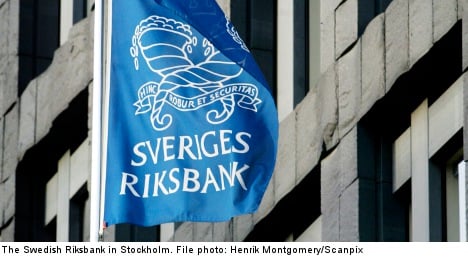“Growth prospects are gradually brightening, but at the same time the forecast is that it will now take longer before inflation attains the target of two percent,” the Riksbank said in a statement.
“The repo rate needs to remain at a low level for a longer period of time to support the recovery to ensure that inflation rises towards the target.”
Not only has the executive board of Sweden’s central bank decided to keep the repo rate at its current level, but it has said it expects to hold the rate at one percent for longer than initially expected. The Riksbank now predict it will not increase the repo rate until the second half of 2014 at the earliest.
The board cited the recovery of the global economy, with progress made in the US and Asia, while the Riksbank said it was keeping an attentive eye on the less solid recovery in the eurozone.
“There is still considerable uncertainty and GDP growth in the euro area is expected to remain weak,” the Riksbank statement read.
Developments at home appeared less gloomy, with the Riksbank keeping an eye on consumption and indebtedness.
“After a weak outcome at the end of last year, the Swedish economy is now showing a gradual recovery. Sentiment among households and companies has improved and consumption and investment are expected to increase more quickly in the coming period,” the statement read.
“Unemployment is still high, but the labour market is expected to improve next year when GDP growth picks up.”
The Riksbank said that Swedish inflation is currently low due to weak demand. The central bank pinned its hopes to increased economic activity but said it now believes it will take longer to hit the two percent target than it had predicted previously.
“This is partly because companies are now assessed to have more difficulty in passing on higher costs to consumer prices, and partly because of the stronger krona,” the Riksbank said in its decision to counter low inflation with the low one percent repo rate.
“Gradual increases in the repo rate are not expected to begin until the second half of 2014, which is around a year later than the earlier forecast.”
The statement went on to explain why the Riksbank will not lower the repo rate further than it stands today.
“The monetary policy conducted is expected to stimulate the economy and inflation at the same time as taking into account the risks linked to households’ high indebtedness.”
The Riksbank underlined, however, that its Wednesday statement was “a forecast, not a promise” and the repo rate could come to be adjusted differently than expected.
TT/The Local/at



 Please whitelist us to continue reading.
Please whitelist us to continue reading.
Member comments